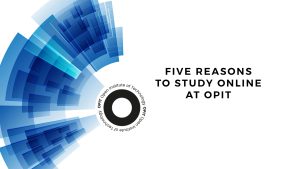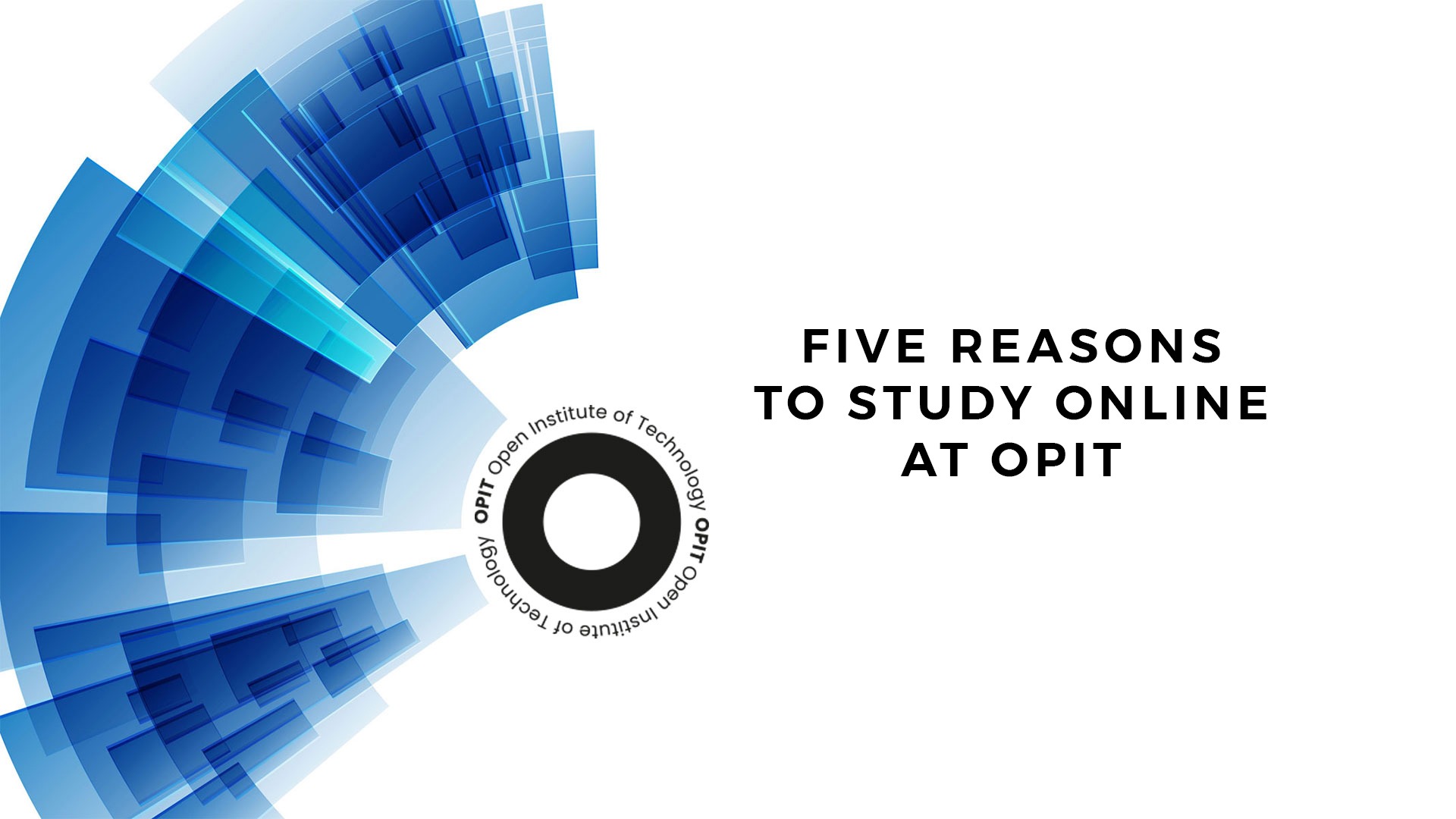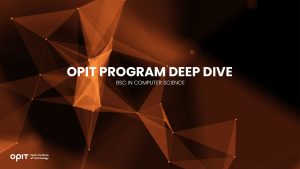

Far from being a temporary educational measure that came into its own during the pandemic, online education is providing students from all over the world with new ways to learn. That’s proven by statistics from Oxford Learning College, which point out that over 100 million students are now enrolled in some form of online course.
The demand for these types of courses clearly exists.
In fact, the same organization indicates that educational facilities that introduce online learning see a 42% increase in income – on average – suggesting that the demand is there.
Enter the Open Institute of Technology (OPIT).
Delivering three online courses – a Bachelor’s degree in computer science and two Master’s degrees – with more to come, OPIT is positioning itself as a leader in the online education space. But why is that? After all, many institutions are making the jump to e-learning, so what separates OPIT from the pack?
Here, you’ll discover the answers as you delve into the five reasons why you should trust OPIT for your online education.
Reason 1 – A Practical Approach
OPIT focuses on computer science education – a field in which theory often dominates the educational landscape. The organization’s Rector, Professor Francesco Profumo, makes this clear in a press release from June 2023. He points to a misalignment between what educators are teaching computer science students and what the labor market actually needs from those students as a key problem.
“The starting point is the awareness of the misalignment,” he says when talking about how OPIT structures its online courses. “That so-called mismatch is generated by too much theory and too little practical approach.” In other words, students in many classes spend far too much time learning the “hows” and “whys” behind computerized systems without actually getting their hands dirty with real work that gives them practical experience in using those systems.
OPIT takes a different approach.
It has developed a didactic approach that focuses far more on the practical element than other courses. That approach is delivered through a combination of classroom sessions – such as live lessons and masterclasses – and practical work offered through quizzes and exercises that mimic real-world situations.
An OPIT student doesn’t simply learn how computers work. They put their skills into practice through direct programming and application, equipping them with skills that are extremely attractive to major employers in the tech field and beyond.
Reason 2 – Flexibility Combined With Support
Flexibility in how you study is one of the main benefits of any online course.
You control when you learn and how you do it, creating an environment that’s beneficial to your education rather than being forced into a classroom setting with which you may not feel comfortable. This is hardly new ground. Any online educational platform can claim that it offers “flexibility” simply because it provides courses via the web.
Where OPIT differs is that it combines that flexibility with unparalleled support bolstered by the experiences of teachers employed from all over the world. The founder and director of OPIT, Riccardo Ocleppo, sheds more light on this difference in approach when he says, “We believe that education, even if it takes place physically at a distance, must guarantee closeness on all other aspects.” That closeness starts with the support offered to students throughout their entire study period.
Tutors are accessible to students at all times. Plus, every participant benefits from weekly professor interactions, ensuring they aren’t left feeling stuck on an educational “island” and have to rely solely on themselves for their education. OPIT further counters the potential isolation that comes with online learning with a Student Support team to guide students through any difficulties they may have with their courses.
In this focus on support, OPIT showcases one of its main differences from other online platforms.
You don’t simply receive course material before being told to “get on with it.” You have the flexibility to learn at your own pace while also having a support structure that serves as a foundation for that learning.
Reason 3 – OPIT Can Adapt to Change Quickly
The field of computer science is constantly evolving.
In the 2020s alone, we’ve seen the rise of generative AI – spurred on by the explosive success of services like ChatGPT – and how those new technologies have changed the way that people use computers.
Riccardo Ocleppo has seen the impact that these constant evolutions have had on students. Before founding OPIT, he was an entrepreneur who received first-hand experience of the fact that many traditional educational institutions struggle to adapt to change.
“Traditional educational institutions are very slow to adapt to this wave of new technologies and trends within the educational sector,” he says. He points to computer science as a particular issue, highlighting the example of a board in Italy of which he is a member. That board – packed with some of the country’s most prestigious tech universities – spent three years eventually deciding to add just two modules on new and emerging technologies to their study programs.
That left Ocleppo feeling frustrated.
When he founded OPIT, he did so intending to make it an adaptable institution in which courses were informed by what the industry needs. Every member of its faculty is not only a superb teacher but also somebody with experience working in industry. Speaking of industry, OPIT collaborates with major companies in the tech field to ensure its courses deliver the skills that those organizations expect from new candidates.
This confronts frustration on both sides. For companies, an OPIT graduate is one for which they don’t need to bridge a “skill gap” between what they’ve learned and what the company needs. For you, as a student, it means that you’re developing skills that make you a more desirable prospect once you have your degree.
Reason 4 – OPIT Delivers Tier One Education
Despite their popularity, online courses can still carry a stigma of not being “legitimate” in the face of more traditional degrees. Ocleppo is acutely aware of this fact, which is why he’s quick to point out that OPIT always aims to deliver a Tier One education in the computer science field.
“That means putting together the best professors who create superb learning material, all brought together with a teaching methodology that leverages the advancements made in online teaching,” he says.
OPIT’s degrees are all accredited by the European Union to support this approach, ensuring they carry as much weight as any other European degree. It’s accredited by both the European Qualification Framework (EQF) and the Malta Qualification Framework (MQF), with all of its courses having full legal value throughout Europe.
It’s also here where we see OPIT’s approach to practicality come into play via its course structuring.
Take its Bachelor’s degree in computer science as an example.
Yes, that course starts with a focus on theoretical and foundational knowledge. Building a computer and understanding how the device processes instructions is vital information from a programming perspective. But once those foundations are in place, OPIT delivers on its promises of covering the most current topics in the field.
Machine learning, cloud computing, data science, artificial intelligence, and cybersecurity – all valuable to employers – are taught at the undergraduate level. Students benefit from a broader approach to computer science than most institutions are capable of, rather than bogging them down in theory that serves little practical purpose.
Reason 5 – The Learning Experience
Let’s wrap up by honing in on what it’s actually like for students to learn with OPIT.
After all, as Ocleppo points out, one of the main challenges with online education is that students rarely have defined checkpoints to follow. They can start feeling lost in the process, confronted with a metaphorical ocean of information they need to learn, all in service of one big exam at the end.
Alternatively, some students may feel the temptation to not work through the materials thoroughly, focusing instead on passing a final exam. The result is that those students may pass, but they do so without a full grasp of what they’ve learned – a nightmare for employers who already have skill gaps to handle.
OPIT confronts both challenges by focusing on a continuous learning methodology. Assessments – primarily practical – take place throughout the course, serving as much-needed checkpoints for evaluating progress. When combined with the previously mentioned support that OPIT offers, this approach has led to courses that are created from scratch in service of the student’s actual needs.
Choose OPIT for Your Computer Science Education
At OPIT, the focus lies as much on helping students to achieve their dream careers as it does on teaching them. All courses are built collaboratively. With a dedicated faculty combined with major industry players, such as Google and Microsoft, it delivers materials that bridge the skill gap seen in the computer science field today.
There’s also more to come.
Beyond the three degrees OPIT offers, the institution plans to add more. Game development, data science, and cloud computing, to name a few, will receive dedicated degrees in the coming months, accentuating OPIT’s dedication to adapting to the continuous evolution of the computer science industry. Discover OPIT today – your journey into computing starts with the best online education institution available.
Related posts

Computer Science is fast becoming one of the most valuable fields of study, with high levels of demand and high-salaried career opportunities for successful graduates. If you’re looking for a flexible and rewarding way to hone your computing skills as part of a supportive global community, the BSc in Computer Science at the Open Institute of Technology (OPIT) could be the perfect next step.
Introducing the OPIT BSc in Computer Science
The OPIT BSc in Computer Science is a bachelor’s degree program that provides students with a comprehensive level of both theoretical and practical knowledge of all core areas of computer science. That includes the likes of programming, databases, cloud computing, software development, and artificial intelligence.
Like other programs at OPIT, the Computer Science BSc is delivered exclusively online, with a mixture of recorded and live content for students to engage with. Participants will enjoy the instruction of world-leading lecturers and professors from various fields, including software engineers at major tech brands and esteemed researchers, and will have many paths open to them upon graduation.
Graduates may, for example, seek to push on with their educational journeys, progressing on to a specialized master’s degree at OPIT, like the MSc in Digital Business and Innovation or the MSc in Responsible Artificial Intelligence. Or they could enter the working world in roles like software engineer, data scientist, web developer, app developer, or cybersecurity consultant.
The bullets below outline the key characteristics of this particular course:
- Duration: Three years in total, spread across six terms.
- Content: Core courses for the first four terms, a student-selected specialization for the fifth term, and a capstone project in the final term.
- Focus: Developing detailed theoretical knowledge and practical skills across all core areas of modern computer science.
- Format: Entirely online, with a mixture of live lessons and asynchronous content you can access 24/7 to learn at your own pace.
- Assessment: Progressive assessments over the course of the program, along with a capstone project and dissertation, but no final exams.
What You’ll Learn
Students enrolled in the BSc in Computer Science course at OPIT will enjoy comprehensive instruction in the increasingly diverse sectors that fall under the umbrella of computer science today. That includes a close look at emerging technologies, like AI and machine learning, as well as introductions to the fundamental skills involved in designing and developing pieces of software.
The first four terms are the same for all students. These will include introductions to software engineering, computer security, and cloud computing infrastructure, as well as courses focusing on the core skills that computer scientists invariably need in their careers, like project management, quality assurance, and technical English.
For the fifth term, students will have a choice. They can select five electives from a pool of 27, or select one field to specialize in from a group of five. You may choose to specialize in all things cybersecurity, for example, and learn about emerging cyber threats. Or you could focus more on specific elements of computer science that appeal to your interests and passions, such as game development.
Who It’s For
The BSc in Computer Science program can suit a whole range of prospective applicants and should appeal to anyone with an interest or passion for computing and a desire to pursue a professional career in this field. Whether you’re seeking to enter the world of software development, user experience design, data science, or another related sector, this is the course to consider.
In addition, thanks to OPIT’s engaging, flexible, and exclusively online teaching and learning systems, this course can appeal to people from all over the globe, of different ages, and from different walks of life. It’s equally suitable for recent high school graduates with dreams of making their own apps to seasoned professionals looking to broaden their knowledge or transition to a different career.
The Value of the BSc in Computer Science Course at OPIT
Plenty of universities and higher education establishments around the world offer degrees in computer science, but OPIT’s program stands out for several distinctive reasons.
Firstly, as previously touched upon, all OPIT courses are delivered online. Students have a schedule of live lessons to attend, but can also access recorded content and digital learning resources as and when they choose. This offers an unparalleled level of freedom and flexibility compared to more conventional educational institutions, putting students in the driving seat and letting them learn at their own pace.
OPIT also aims not merely to impart knowledge through lectures and teaching, but to actually help students gain the practical skills they need to take the next logical steps in their education or career. In other words, studying at OPIT isn’t simply about memorizing facts and paragraphs of text; it’s about learning how to apply the knowledge you gain in real-world settings.
OPIT students also enjoy the unique benefits of a global community of like-minded students and world-leading professors. Here, distance is no barrier, and while students and teachers may come from completely different corners of the globe, all are made to feel welcome and heard. Students can reach out to their lecturers when they feel the need for guidance, answers, and advice.
Other benefits of studying with OPIT include:
- Networking opportunities and events, like career fairs, where you can meet and speak with representatives from some of the world’s biggest tech brands
- Consistent support systems from start to finish of your educational journey in the form of mentorships and more
- Helpful tools to expedite your education, like the OPIT AI Copilot, which provides personalized study support
Entry Requirements and Fees
To enroll in the OPIT BSc in Computer Science and take your next steps towards a thrilling and fulfilling career in this field, you’ll need to meet some simple criteria. Unlike other educational institutions, which can impose strict and seemingly unattainable requirements on their applicants, OPIT aims to make tech education more accessible. As a result, aspiring students will require:
- A higher secondary school leaving certificate at EQF Level 4, or equivalent
- B2-level English proficiency, or higher
Naturally, applicants should also have a passion for computer science and a willingness to study, learn, and make the most of the resources, community, and support systems provided by the institute.
In addition, if you happen to have relevant work experience or educational achievements, you may be able to use these to skip certain modules or even entire terms and obtain your degree sooner. OPIT offers a comprehensive credit transfer program, which you can learn more about during the application process.
Regarding fees, OPIT also stands out from the crowd compared to conventional educational institutions, offering affordable rates to make higher tech education more accessible. There are early bird discounts, scholarship opportunities, and even the option to pay either on a term-by-term basis or a one-off up-front fee.

The Open Institute of Technology (OPIT) provides a curated collection of courses for students at every stage of their learning journey, including those who are just starting. For aspiring tech leaders and those who don’t quite feel ready to dive directly into a bachelor’s degree, there’s the OPIT Foundation Program. It’s the perfect starting point to gain core skills, boost confidence, and build a solid base for success.
Introducing the OPIT Foundation Year Program
As the name implies, OPIT’s Foundation Program is about foundation-level knowledge and skills. It’s the only pre-bachelor program in the OPIT lineup, and successful students on this 60-ECTS credit course will obtain a Pre-Tertiary Certificate in Information Technology upon its completion. From there, they can move on to higher levels of learning, like a Bachelor’s in Digital Business or Modern Computer Science.
In other words, the Foundation Program provides a gentle welcome into the world of higher technological education, while also serving as a springboard to help students achieve their long-term goals. By mixing both guided learning and independent study, it also prepares students for the EQF Level 4 experiences and challenges they’ll face once they enroll in a bachelor’s program in IT or a related field.
Here’s a quick breakdown of what the OPIT Foundation Program course involves:
- Duration: Six months, split into two terms, with each term lasting 13 weeks
- Content: Three courses per term, with each one worth 10 ECTS credits, for a total of 60
- Focus: Core skills, like mathematics, English, and introductory-level computing
- Format: Video lectures, independent learning, live sessions, and digital resources (e-books, etc.)
- Assessment: Two to three assessments over the course of the program
What You’ll Learn
The OPIT Foundation Program doesn’t intensely focus on any one particular topic, nor does it thrust onto you the more advanced, complicated aspects of technological education you would find in a bachelor’s or master’s program. Instead, it largely keeps things simple, focusing on the basic building blocks of knowledge and core skills so that students feel comfortable taking the next steps in their studies.
It includes the following courses, spread out across two terms:
- Academic Skills
- Mathematics Literacy I
- Mathematics Literacy II
- Internet and Digital Technology
- Academic Reading, Writing, and Communication
- Introduction to Computer Hardware and Software
Encompassing foundational-level lessons in digital business, computer science, and computer literacy, the Foundation Program produces graduates with a commanding knowledge of common operating systems. Exploring reading and writing, it also helps students master the art of communicating their ideas and responses in clear, academic English.
Who It’s For
The Foundation Year program is for people who are eager to enter the world of technology and eventually pursue a bachelor’s or higher level of education in this field, but feel they need more preparation. It’s for the people who want to work on their core skills and knowledge before progressing to more advanced topics, so that they don’t feel lost or left behind later on.
It can appeal to anyone with a high school-level education and ambitions of pushing themselves further, and to anyone who wants to work in fields like computer science, digital business, and artificial intelligence (AI). You don’t need extensive experience or qualifications to get started (more on that below); just a passion for tech and the motivation to learn.
The Value of the Foundation Program
With technology playing an increasingly integral role in the world today, millions of students want to develop their tech knowledge and skills. The problem is that technology-oriented degree courses can sometimes feel a little too complex or even inaccessible, especially for those who may not have had the most conventional educational journeys in the past.
While so many colleges and universities around the world simply expect students to show up with the relevant skills and knowledge to dive right into degree programs, OPIT understands that some students need a helping hand. That’s where the Foundation Program comes in – it’s the kind of course you won’t find at a typical university, aimed at bridging the gap between high school and higher education.
By progressing through the Foundation Program, students gain not just knowledge, but confidence. The entire course is aimed at eliminating uncertainty and unease. It imbues students with the skills and understanding they need to push onward, to believe in themselves, and to get more value from wherever their education takes them next.
On its own, this course won’t necessarily provide the qualifications you need to move straight into the job market, but it’s a vital stepping stone towards a degree. It also provides numerous other advantages that are unique to the OPIT community:
- Online Learning: Enjoy the benefits of being able to learn at your own pace, from the comfort of home, without the costs and inconveniences associated with relocation, commuting, and so on.
- Strong Support System: OPIT professors regularly check in with students and are on hand around the clock to answer queries and provide guidance.
- Academic Leaders: The OPIT faculty is made up of some of the world’s sharpest minds, including tech company heads, experienced researchers, and even former education ministers.
Entry Requirements and Fees
Unlike OPIT’s other, more advanced courses, the Foundation Program is aimed at beginners, so it does not have particularly strict or complex entry requirements. It’s designed to be as accessible as possible, so that almost anyone can acquire the skills they need to pursue education and a career in technology. The main thing you’ll need is a desire to learn and improve your skills, but applicants should also possess:
- English proficiency at level B2 or higher
- A Secondary School Leaving Certificate, or equivalent
Regarding the fees, OPIT strives to lower the financial barrier of education that can be such a deterrent in conventional education around the world. The institute’s tuition fees are fairly and competitively priced, all-inclusive (without any hidden charges to worry about), and accessible for those working with different budgets.
Given that all resources and instruction are provided online, you can also save a lot of money on relocation and living costs when you study with OPIT. In addition, applicants have the option to pay either up front, with a 10% discount on the total, or on a per-term basis, allowing you to stretch the cost out over a longer period to ease the financial burden.
Have questions?
Visit our FAQ page or get in touch with us!
Write us at +39 335 576 0263
Get in touch at hello@opit.com
Talk to one of our Study Advisors
We are international
We can speak in:


